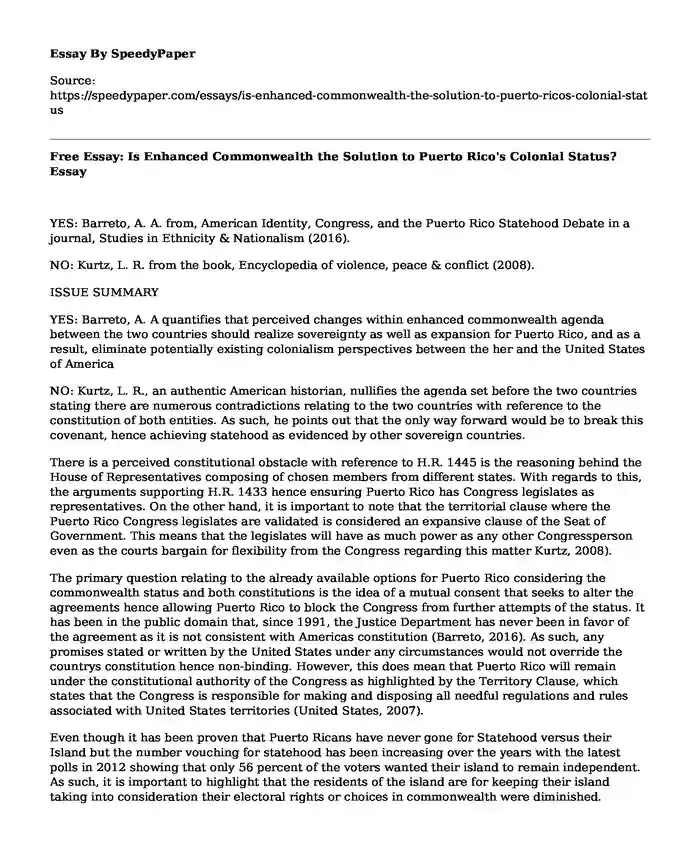
| Type of paper: | Essay |
| Categories: | International relations Political science |
| Pages: | 3 |
| Wordcount: | 657 words |
YES: Barreto, A. A. from, American Identity, Congress, and the Puerto Rico Statehood Debate in a journal, Studies in Ethnicity & Nationalism (2016).
NO: Kurtz, L. R. from the book, Encyclopedia of violence, peace & conflict (2008).
ISSUE SUMMARY
YES: Barreto, A. A quantifies that perceived changes within enhanced commonwealth agenda between the two countries should realize sovereignty as well as expansion for Puerto Rico, and as a result, eliminate potentially existing colonialism perspectives between the her and the United States of America
NO: Kurtz, L. R., an authentic American historian, nullifies the agenda set before the two countries stating there are numerous contradictions relating to the two countries with reference to the constitution of both entities. As such, he points out that the only way forward would be to break this covenant, hence achieving statehood as evidenced by other sovereign countries.
There is a perceived constitutional obstacle with reference to H.R. 1445 is the reasoning behind the House of Representatives composing of chosen members from different states. With regards to this, the arguments supporting H.R. 1433 hence ensuring Puerto Rico has Congress legislates as representatives. On the other hand, it is important to note that the territorial clause where the Puerto Rico Congress legislates are validated is considered an expansive clause of the Seat of Government. This means that the legislates will have as much power as any other Congressperson even as the courts bargain for flexibility from the Congress regarding this matter Kurtz, 2008).
The primary question relating to the already available options for Puerto Rico considering the commonwealth status and both constitutions is the idea of a mutual consent that seeks to alter the agreements hence allowing Puerto Rico to block the Congress from further attempts of the status. It has been in the public domain that, since 1991, the Justice Department has never been in favor of the agreement as it is not consistent with Americas constitution (Barreto, 2016). As such, any promises stated or written by the United States under any circumstances would not override the countrys constitution hence non-binding. However, this does mean that Puerto Rico will remain under the constitutional authority of the Congress as highlighted by the Territory Clause, which states that the Congress is responsible for making and disposing all needful regulations and rules associated with United States territories (United States, 2007).
Even though it has been proven that Puerto Ricans have never gone for Statehood versus their Island but the number vouching for statehood has been increasing over the years with the latest polls in 2012 showing that only 56 percent of the voters wanted their island to remain independent. As such, it is important to highlight that the residents of the island are for keeping their island taking into consideration their electoral rights or choices in commonwealth were diminished.
The fallacy on the NO side that could also be considered somewhat a third path related to a non-territorial status irrespective of the independence or statehood achieved through the Federal system framework, as established under the national government and the United States constitution.
According to my perception, Barreto, A. A., has a better analogy because his thesis stands for a better future regarding Puerto Ricans plus the constitutions backs them up. In relation to this, I believe he is most analytical. Nonetheless, both authors provide unbiased standings as proven by the law and the constitution of the United States. To my reasoning, Barreto, A. A. is most correct since his agenda is aligned to a greater future of Puerto Ricans. Recent updates on this topic are pushing Puerto Ricans to act towards statehood.
References
Barreto, A. A. (2016). American Identity, Congress, and the Puerto Rico Statehood Debate. Studies in Ethnicity & Nationalism, 16(1), 100-117
Kurtz, L. R. (2008). Encyclopedia of violence, peace & conflict: Vol 3. Amsterdam [etc.: Elsevier.
United States. (2007). Puerto Rico: Hearing before the Committee on Energy and Natural Resources, United States Senate, One Hundred Ninth Congress, second session ... November 15, 2006. Washington: U.S. G.P.O.
Cite this page
Free Essay: Is Enhanced Commonwealth the Solution to Puerto Rico's Colonial Status?. (2019, Oct 29). Retrieved from https://speedypaper.net/essays/is-enhanced-commonwealth-the-solution-to-puerto-ricos-colonial-status
Request Removal
If you are the original author of this essay and no longer wish to have it published on the SpeedyPaper website, please click below to request its removal:
- Free Essay: An Academic Challenge I Can Overcome
- Free Essay: A Balanced Scorecard for Ludwig Freytag Construction Company
- Essay Sample on Washing Machine Invention
- Essay Example on Social Media's Positive Influence by Josh Rose
- Education Essay Example: NAEYC Standard 5 and 6 Reflective Statements
- Paper Example. Review of Research Articles
- Essay Example: Read Research Articles
Popular categories




